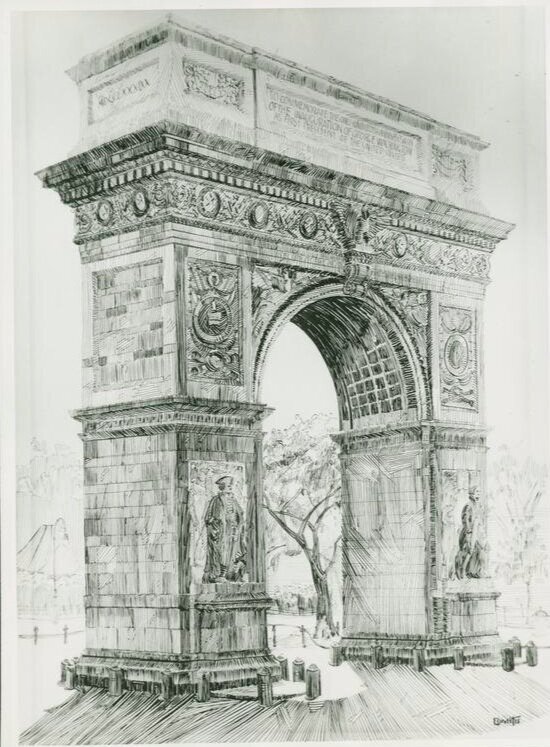Join Us June 23rd at 8pm for Harp & Chamber Orchestra as Part of the Washington Square Music Festival
On Tuesday June 23 at 8 pm in Washington Square, Harp & Chamber Orchestra features an unusual program ranging from a setting of Edgar Allen Poe’s “The Mask of Red Death” by André Caplet, to the more familiar Peer Gynt suite by Grieg. The harp, played by Lynette Wardle, is the featured instrument in three works. The Festival is under the auspices of the Washington Square Association, Inc. Seating is on a first-come, first served basis. Festival info line: 212-252-3621 www.washingtonsquaremusicfestival.org
Festival Chamber Orchestra conducted by Lutz Rath
Lynette Wardle, harp
Where: Washington Square Park, main stage south of Fifth Avenue, Rainspace: NYU’s Frederick Loewe Theatre, 35 West 4th Street
Tuesday, June 23, 8 pm
Andreas Schein: Concerto for clarinet and bassoon
André Caplet: Conte fantastique for harp and string quartet, and speaker
-- from E.A. Poe’s “The Mask of Red Death”
Sofia Gubaidulina: Five Etudes for harp, double bass, and percussion
Edvard Grieg: Peer Gynt suite for chamber orchestra and harp
André Caplet died in 1925 from the effects of poison gas in the trenches of the First World War. He was only forty-seven. The Conte fantastique for harp and strings, inspired by Poe’s tale “The Masque of the Red Death”, was published in 1924, but was based on an unpublished “symphonic study” dating from 1909. It is impossible therefore, without seeing this study, to be certain of what in the Conte is post-war and what pre-war. What is unmistakable, though, is Caplet’s determination to rethink instrumental capabilities. Here he liberates the harp from its traditional role of being purely pastoral, decorative, and decorous.
Any composer would have to incorporate somehow the chiming of the ebony clock to mark the hours of the revels, at which “the dreams are still-frozen as they stand.” Caplet chooses to give the harpist only the chimes of eleven o’clock and the more fateful ones of midnight, upon which the masked figure of the Red Death appears, “tall and gaunt, and shrouded from head to foot in the habiliments of the grave”. The “buzz, or murmur” of the assembled company at this apparition is expressed in string tremolos, glissandos and harmonics that look forward to the textures imagined by Boulez thirty years later.
Sofia Gubaidulina was born in Chistopol in the Tatar Republic of the Soviet Union in 1931. After instruction in piano and composition at the Kazan Conservatory, she studied composition with Nikolai Peiko at the Moscow Conservatory, pursuing graduate studies there under Vissarion Shebalin. Until 1992, she lived in Moscow. Since then, she has made her primary residence in Germany, outside Hamburg.
Gubaidulina made her first visit to North America in 1987 as a guest of Louisville's "Sound Celebration.” She has returned many times since as a featured composer of festivals, notably Boston’s "Making Music Together" (1988), Vancouver's "New Music" (1991), and Tanglewood (1997).
She has achieved international acclaim for her unique musical oeuvre which draws on Eastern and Western musical traditions and reflects a deep-rooted belief in the mystical and religious qualities of music.
Upcoming Concerts in the Park
Tuesday, June 30, 8 pm
Rainspace: NYU’s Frederick Loewe Theatre, 35 West 4th Street
Winds, Strings, and Voice
Festival Chamber Ensemble
Max Bruch: Septet for winds and strings (1849)
Alexander von Zemlinsky: Maiblumen blühten überal/Mayflowers Bloom All Over for mezzo-soprano
& string sextet (text by Richard Dehmel), Laila Salins, soloist
Ludwig van Beethoven: Septet
Tuesday, July 7, 8 pm
Rainspace: NYU’s Frederick Loewe Theatre, 35 West 4th Street
American Jazz
New York Jazzharmonic, 17 piece band
Ron Wasserman, Artistic Director and Leader
JP Jofre, bandoneon
Elvy Yost, vocalist
Music of Billy Strayhorn, Woody Herman, Count Basie, Scott Joplin, John Philip Sousa, JP Jofre, Miho Hazama, and a recreation of the 1938 Carnegie Hall version of Benny Goodman's Sing Sing Sing.
About the Washington Square Music Festival
The Washington Square Music Festival is made possible with public funding through Councilmember Margaret Chin & The New York City Department of Cultural Affairs, and New York State Council on the Arts, a State Agency. Generous grants from The Earle K. & Katherine F. Moore Foundation, The Horace W. Goldsmith Foundation, The Washington Square Association, Music Performance Trust Fund, The Margaret Neubart Foundation Trust, New York University Community Affairs & NYU Community Fund, Salamon-Abrams Family Fund, Three Sheets/Off the Wagon/Down the Hatch, Con Edison, the Washington Square Park Conservancy and The Alec Baldwin Foundation, are deeply appreciated, as is invaluable help from NYC Parks & Recreation.
